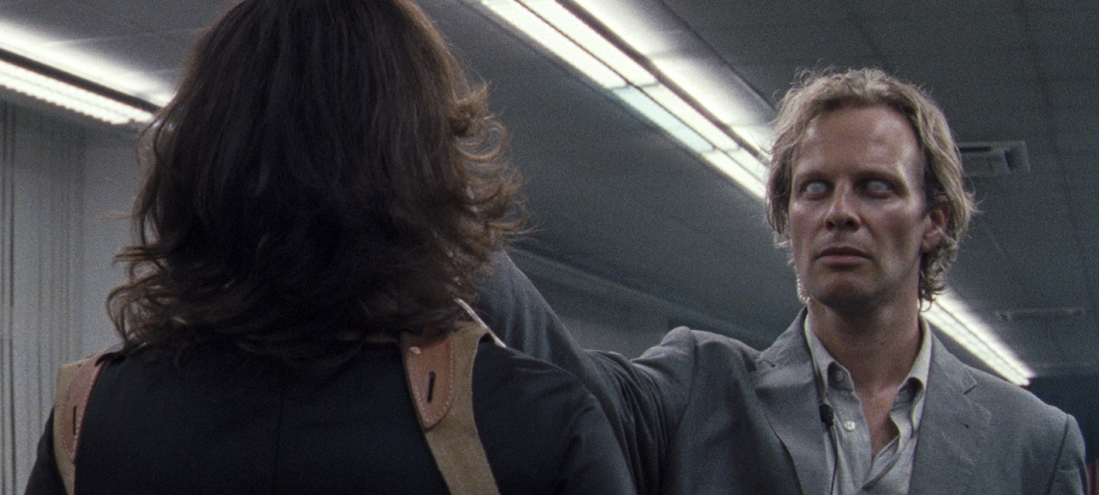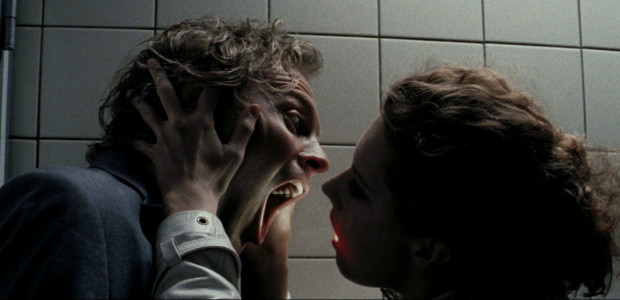
Luz (Luana Veliz) has jumped out of her cab mid ride, and made her way to the nearest police precinct. All she can bring herself to mutter to the tiny skeleton crew staff is a blasphemous inversion of the Lord’s Prayer, crass and full of perverted, sexualized language.
At a drink joint across town, Luz’s girlfriend Nora (Julia Riedler) aggressively flirts with a psychiatrist camp out at the end of the bar. She lays it on thick, getting the good doc drunk, telling him of her and Luz’s teenage years in a Catholic school, where the Chilean born taxi driver engaged in anti-Christian acts and Satanic rituals.
And the demon she accidentally summoned is back to make everyone’s night a bad one.

Tilman Singer’s LUZ is an easier film to admire then like. On purely compositional and conceptual levels, its an accomplishment, made all the more so when you realize that it is not only the German filmmaker’s debut film — but was made has his film school thesis project (feel like a slacker yet?) It’s almost as if Singer was channeling Rainer Werner Fassbinder putting his own spin on the omnipresent Beelzebubian horrors of the ‘70s and ‘80s. Singer directs with a slow burn concrete rigorousness, all wide angles staring into grey stone walled rooms, that gives way to a florid and committed theatricality as the demonic craziness ramps up and supernatural terrors close in on the characters.
The only problem? You don’t know to what ends this is all for.
There’s an emotional disconnect to LUZ that makes the aesthetic qualities of it stand out, for better and worse. Shot in grainy 16MM, it’s absolutely beautiful to look at, in a nostalgic sense, coming off like some lost German horror film from 1980. But it also feels like a stunt. It’s only 0 70 minutes long — no surprise, given that it is essentially a student film — but, like many student films, it often feels like Singer is showing for no good purpose but to show off. He embraces an abstract theatricality, and he certainly has the talent for it. But it also feels distant and muddled in what it’s trying to say. Watching LUZ, it’s quite obvious Singer is obvious inspired by films like POSSESSION — it’s just not clear why.
For the most part, the film seems to be about romantic obsession, angled through the lens of a pair of high school lesbian lovers reuniting — only one of those lovers is apparently also a lovestruck demon with a thing for Fulci white eyes. But the movie increasingly obfuscates any kind of emotional impact by increasing the surrealism to almost untenable levels. Whatever Singer is trying to say on the nature of love, of lesbians, of demons, of hypnosis, gets lost in the show-offy verve of his direction.
That said, that direction — and the performances within — also, ironically, keep the movie afloat. Velis is an absolute marvel in the titular role, throwing herself physically and emotively in the complex demands of her role, all in her very first feature film role. And Singer is, for all the pomp, a gifted director; even as you feel removed from the film, you can enjoy it on the surface level of what he’s done. There’s clearly a talent buried somewhere within Tilman Singer, and maybe one day LUZ will be looked at with fondness as the rudimentary building blocks of a great filmmaker. He just needs to learn to balance his pretensions with a more resonant core.

Love also wrecks you in another ‘70s Euro-horror infused bauble playing Fantastic Fest, only instead of Germanic severity, Yann Gonzalez’s KNIFE + HEART goes all in on luridly colorful Dario Argento steez and Paul Verhoeven cheeky sexual perversity, as a grunting serial killer in a makeshift leather BDSM mask plunges and switchblade dildo into tender, naked male flesh.
Call it QUEER EYE FOR THE GIALLO GUY. Anne (model/actress Vanessa Paradis, who’s terrific, selling her damaged, distraught character) is a producer and director of gay porn in late ‘70s France, with a cadre of loyal, not always well-paid young men bringing her inventive, fantastical masculine erotica to vivid, semen-spurting life. But Anne’s life as a successful purveyor of boys-only blue movies is beset by, not only her lingering lovelorn obsession with her editor and ex Lois (Kate Moran), their ten year relationship falling apart due to Anne’s alcoholism, but the serial killer who has targeted the twinks and studs under her command.
As Anne tries to salvage the faltering relationship that she’s damaged beyond repair, she tries to keep her boys safe while preventing her discount smut factory from crashing under the weight of talent frightened about being skewered at the end of a madman’s rubber-sheathed blade, finding inspiration in the back-burnered police investigation to make a salacious porno-noir called HOMOCIDAL out of the events surrounding her, while taking off to the countryside to conduct her own investigation.

Gonzalez and Cristiano Mangione’s script is sometimes a mess, not always following through on strands introduced and bringing on characters for significant stretches that don’t have any real bearing on the plot (beyond the occasional exposition engine), while also seemingly reversing other character’s motivations. That occasionally makes KNIFE + HEART feel ungainly, as it sometimes wobbles between personal drama, cheerfully crude comedic beats and grisly, artfully brutal slasher murders, but that also makes it feel true to its lascivious grindhouse inspirations, as even maestro Argento’s films often had a shaggy, sensationalist charm.
And Gonzalez certainly indulges in the prurient sensationalism that his material demands, not only in the scenes of grinding male on male flesh, but in the colorful, gialli-infused kill scenes and the DePalma-evoking voyeuristic excess (including a split screen with a great money shot climax.) KNIFE + HEART plays a lot like William Friedkin’s controversial 1980 gay slasher CRUISING, only with the hella problematic griminess of that film dialed way down and the humanistic empathy for his character’s dialed way back up. Gonzalez actually cares about this band of misfit outsiders, the whiskey chugging queen and the men under her command, joyfully cranking out their own acts of erotic abandon in the cavernous warehouse they call home, until a maniac decides to take a blade to their reveries. And even then, Gonzalez finds sympathy even in our homicidal maniac’s backstory, making it all hurt when these characters come to grisly ends, all wrapped up in vivid colors and the lushness of the French countryside. Whereas LUZ comes off as a stylized, well-made stunt, KNIFE + HEART finds a reason to care.

Tags: Cristiano Mangione, Demon, European, Fantastic Fest 2018, Giallo, Horror, Luana Velis, Tilman Singer, Vanessa Paradis, Yann Gonzalez


No Comments